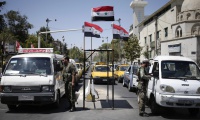Home » Syria » SYR - News » Syria: Further Cases of Enforced Disappearances following Arrests at Checkpoints
Over the past two months, Alkarama raised three more cases of enforced disappearances with the United Nations Working Group on Enforced Disappearances (WGEID) which followed the same pattern.
On 26 May 2012, Nouh Al Bakour, a 24-year-old student, was on a taxi going home in Maarrat Dibsah – a village located in Saraqib Nahiyah in the Idlib District – from Adra, when he reached a checkpoint situated in the town of Al Mleiha, Damascus countryside, and controlled by members of the Air Force Intelligence. The latter stopped the car and demanded for its passengers' IDs and mobile phones. As the other travellers could witness, once the security officers noticed that in Nouh's phone there was a song popular among demonstrators during the Syrian revolution, they immediately arrested him. On the same day of his disappearance, Nouh's family was informed that he was detained in Al Mezzeh military airport near Damascus, but they were never allowed to visit him and any further demand on his fate and whereabouts was dimply dismissed.
Only about a month after Nouh's arrest, his uncle Ibrahim was arrested too. In fact, on 2 July 2012 Ibrahim Al Bakour, a 32-year-old employee in the Ministry of Higher Education in Damascus, was travelling by car to Hama to monitor exams with some colleagues. However, he was stopped at a checkpoint situated at the entrance of the city and under the control of members of the Military Intelligence – known as "Military security" –. As his colleagues could witness, he was arrested and brought to an unknown destination. Ibrahim's family managed to know that he was detained in Sednaya military prison and visited him there on 22 September 2014, when they found him in very poor physical conditions. However, following this date, his relatives were denied any further visit and information on his fate and whereabouts. Consequently, on 16 June 2016, Alkarama and Human Rights Guardians raised the cases of Nouh and Ibrahim with the UN Special Procedures hoping it will help shed light on their whereabouts.
Furthermore, Alkarama documented the case of Saad Sinbul, a 45 year-old greengrocer who disappeared following his arrest on 25 July 2012 while travelling from Lebanon to Syria. After crossing the border, he reached the checkpoint at Al Nizaria in Al Qusayr, a city in Western Syria, when the bus was stopped and members of the Military Intelligence Directorate searched the bus and arrested him. In August 2014, Saad's wife was informed by a former co-detainee that he was held in the Al Khateeb General Intelligence Branch in Damascus, while in late May 2016, she unofficially learned that her husband was detained in Sednaya military prison. However, her repeated inquiries about Saad's fate with the security forces were in vain. On 3 June 2016, Alkarama submitted his case to the attention of the WGEID, with the hope that the UN group of experts will shed light on his fate and whereabouts.
For more information or an interview, please contact This email address is being protected from spambots. You need JavaScript enabled to view it. (Tel: +41 22 734 1008).
 Algeria
Algeria Bahrain
Bahrain Djibouti
Djibouti Egypt
Egypt Iraq
Iraq Palestine/Israel
Palestine/Israel Jordan
Jordan Kuwait
Kuwait Lebanon
Lebanon Libya
Libya Mauritania
Mauritania Morocco
Morocco Oman
Oman Qatar
Qatar Saudi Arabia
Saudi Arabia Sudan
Sudan Syria
Syria Tunisia
Tunisia United Arab Emirates
United Arab Emirates Yemen
Yemen Other Countries
Other Countries







